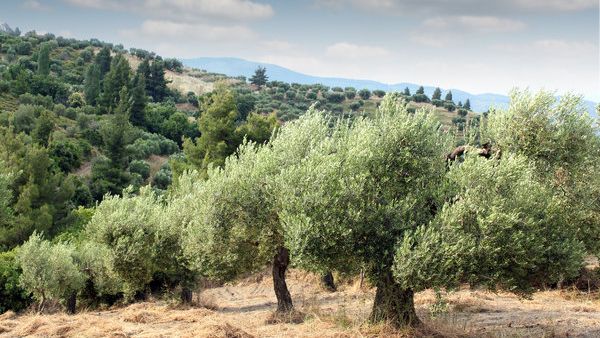A chorus of angry voices erupted around us as a friend and I perused portable stalls laden with ripe figs, bright orange knafeh, and taboon bread at an intersection of a kaleidoscopic market in the West Bank town of Jenin. Looking around with confusion and faint apprehension, I finally spotted a man standing among the shops, devouring a syrup-drenched wedge of harīssa. He looked utterly content, despite the public shaming he had received for enjoying a mid-day snack during Ramadan. The event highlighted the complex significance of food in daily life in the Middle East where a deceptively simple piece of semolina cake can at once be a source of pleasure, a dietary taboo, and a public violation of religious and social norms.
The multifaceted importance of food and its consumption subverts widely held notions that food and agriculture are purely apolitical. Upon learning that I research foodways (the study of history and societies in relation to food) in Palestine, people often comment approvingly about how I have managed to find something “apolitical” to study despite the region’s emotive and polarizing history. Contrary to these assumptions, however, foodways are anything but apolitical, particularly in the context of the Israeli-Palestinian conflict. Decoding what people eat, where it comes from, how it is produced, and who prepares it involves religious orientation, ethno-national identification, and, often, political perspectives regarding the larger conflict.
The scope of Palestinian and Israeli foodways extends beyond gastro-nationalistic debates on the provenance of za’tar and knafeh or legal battles between Palestinians and Israelis regarding access to and ownership of agricultural land. Often times, they involve members of the international community, and provide socio-cultural paths through which non-state actors become involved in Israel-Palestine. This is clearly evident in the phenomenon of agricultural tourism, which draws international volunteers to Palestinian communities and Jewish settlements throughout the West Bank.
The International Dimensions of Palestinian Food and Agriculture
In 2001, the Young Women’s Christian Association (YWCA) of Palestine and the East Jerusalem Young Man’s Christian Association (YMCA) established the Joint Advocacy Initiative (JAI). As stated on its website, the JAI advances “peace with justice in the occupied Palestinian territories.” One of the JAI’s main activities is the Olive Tree Campaign (OTC), which launched in 2002. The OTC unites international donors and volunteers with Palestinian olive farmers. This initiative treats food and agriculture as ideological, economic, and political weapons in the Israeli-Palestinian conflict. The JAI operates on the principle that the West Bank is occupied territory. As a result and in accordance with international law, the JAI views Israeli settlements throughout the West Bank as illegal under various international legal instruments, including but not limited to the Oslo Accords. The settlements, as well as the economic enterprises that make them financially viable, violate international laws prohibiting the construction of settlements within occupied territory and contravene Oslo II.
The OTC brings together volunteers from all over the world who travel to the West Bank to assist Palestinian farmers with tree planting and olive harvesting, both of which are essential to Palestinian livelihood and subsistence. The vast majority of harvested olives are used in olive oil production. By assisting Palestinian farmers, approximately 48% of whom rely on olive cultivation as their primary source of income, OTC volunteers provide protection against the Israeli Defense Forces (IDF) (which frequently uproots olive trees), settlers (some of whom use “price tagging,” the destruction of Palestinian property and agricultural land, to undermine the viability of Palestinian livelihood in the West Bank), and the Israeli government (which employs an Ottoman land law that declares land that has remained uncultivated for three years to be state property).
The international dimensions of agricultural production in the West Bank extend beyond the volunteer tourists who travel to the West Bank every year. Organizations, such as Zaytoun and Canaan Fair Trade, connect with farmers and farming cooperatives throughout the West Bank to support local Palestinian agriculture and make Palestinian products available to consumers around the world.
The International Dimensions of Israeli Food & Agriculture
The connection between international consumers, volunteers, and West Bank inhabitants is not unique to Palestinian agricultural efforts. A parallel network of international actors exists to support Jewish settlements in the West Bank in the maintenance and creation of vineyards and wine production.
As of 2011, a comprehensive report on Israeli vineyards by The Coalition of Women for Peace counted 29 vineyards in the West Bank. These vineyards have economic, political, legal, and religious significance. They provide important sources of income for settler communities, create political and tangible claims to West Bank land, and represent the fulfillment of biblical prophecies predicating the Messiah’s arrival on Jewish return to and cultivation of the land of Israel.Israel’s Ministry of Tourism indicates the development of wine tourism as one of its goals, and the Israeli government provides economic incentives to settlers for grape cultivation. Because they fall within “National Priority Regions,” West Bank settlement vineyards are eligible for funding from the Ministries of Tourism, Agriculture, and Defense. From 2008 to 2010 alone, these ministries and the World Zionist Organization provided some 21.9 million shekels to West Bank settlers’ agricultural projects.
Like Palestinian olive orchards, Israeli settler vineyards attract international volunteers. Every year, many people (preponderantly Christians) travel to the West Bank to volunteer on vineyards to help with upkeep and grape harvesting. These volunteers are prohibited from partaking in the production of wine as Kosher dietary laws forbid the involvement of non-Jews in any part of the production process. Volunteers are, however, are able to participate in grape cultivation and harvesting without compromising the wine’s Kosher certification.
HaYovel is a Tennessee-based Christian volunteer organization that coordinates annual agricultural tourism trips to West Bank settlements (HaYovel’s website uses the Israeli term for the region, “Judea and Samaria”). The group is ideologically aligned with and supports the Israeli settler movement in the West Bank. Its website contains numerous biblical verses, conveying the sense of duty, grounded in prophecy that is central to its ideology. HaYovel’s founders and volunteers are guided by the verse, “You shall yet plantvines on the mountains of Samaria” (Jeremiah 31:5), and express their commitment to supporting God and Israel in the organization’s mission statement and promotional videos. American volunteers interviewed in Louis Theroux’s documentary The Ultra Zionists similarly describe themselves as part of biblical prophecy.
Both for those who support and oppose Israeli settlement in the West Bank, the vineyards occupy a significant place in the debate. On the one hand, the vineyards tie settlements to international markets, as hundreds of thousands of bottles of Kosher wine are exported around the world every year. Through volunteerism and purchase of wine, the international community is involved in ideologically and economically supporting these vineyards. On the other hand, the Boycott, Divestment and Sanctions (BDS) movement has identified the vineyards (as well as other enterprises that strengthen the West Bank settlement economy) as supporting the entrenchment of illegal Israeli outposts.
The Political Power of Land and Food
Legal scholar Irus Braverman observes that: “It seems obvious that landscape is quite capable of becoming an idol in its own right; that is, a potent, ideological representation that serves to naturalize power relations and erase history and legibility.”[1] Both Palestinians and Israelis (and their respective supporters) point to the cultivation of land and production of food as proof they have exclusive rights to the land of Israel-Palestine. Braverman’s reflection highlights the central role of food and agriculture in the politics, economics, and ethno-religious identities of those involved in the Israeli-Palestinian conflict.
It is worth noting, however, that the role of foodways is not exclusively divisive. The collaborative efforts of Jewish Israeli chef Yotam Ottolenghi and Palestinian Israeli chef Sami Tamimi, for example, resulted in the highly acclaimed cookbook Jerusalem.The Parent Circle-Families Forum, a support group for bereaved Palestinians and Israelis, also produced the cookbook Jam Session – Recipes for Friendship, Jams and Remembrance. In the small village of Ein Rafa, a Jewish-Muslim couple own and operate the restaurant “Majda,” recently featured on Chef Anthony Bourdain’s food show, Parts Unknown. Collectively, these instances of culinary cooperation provide precedents for food’s potential force as a mediating influence between Palestinians and Israelis.
In the wake of Operation Protective Edge, it is difficult to imagine how foodways may be able to bring about widespread change in the region. While various Middle Eastern foods, such as hummus, have been discussed as a potentially unifying symbol for Palestinians and Israelis, there are many systemic inequalities and historical conflicts that must be addressed before the culinary fusion that is a hallmark of Middle Eastern cuisines can be used to bind those who are currently so divided.
[1] Irus Braverman, Planted Flags: Trees, Land, and Law in Israel/Palestine (New York: Cambridge University Press, 2009), page.








